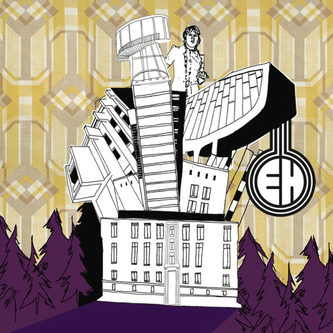"An obelisk of noise that rose rudely above the treetops of the Bialowieska Forest, the Endless House project shone for a mere six weeks in the spring of 1973." I hold in my hands a beige Velcro-sealed paper bag. Endless House, the debut compilation from the Endless House Foundation is just about the most exquisitely packaged CD I’ve seen for a long time. It shows exactly what can be achieved with a little decadent imagination. Inside lies a card for each compiled ‘composer’, the CD itself sleeved in a cartoon modernist depiction of the venue and some enticing photographs detailing the baffling modernist interior of this super club with its "unmanageable" cyber-baroque décor and five pneumatic dance floors!
The outer packaging narrative goes on to detail the decadent machinations of "audiophile/maniac" Jiri Kantor, publisher of the Parisian magazine Otium International and his ill-conceived pursuit of a modernist discotheque Xanadu – an undoubtedly chrome and concrete plated edifice garishly planted in the rural paradise straddling the border between Belarus and Poland.
The Endless House Foundation then, in its recorded format, is essentially a compilation of 12 fictitious sonic memories; gleaming songs evocative of characters, of ideas and ideals and of a unique and fantastic environment. Specifically, a piece by such unknown auteurs as Felix Uran, Rasmus Folk, Earnasto Rogers and Klaus Pinter and individual pieces by Johannus Arpensium, Walter Schnaffs, Ernest Kantor and our erstwhile misguided hero Jiri Kantor.
So what we have here of course is sonic fiction in excelsis. This is the first project from the protagonists at Dramatic Records (the strange corporate world of Hans Tanza being the second and equally brilliant foray into the media-scape) who have set a subtle contagion in motion with interviews, mixes and excerpts from books appearing in blogs (particularly 20JazzFunkGreats), websites and on radio shows. Utilising the refined approach of the more switched-on Hauntologists (Jon Brooks, Moon Wiring Club, Pye Corner Audio and the dearly-missed Broadcast for example) in avoiding the pitfalls of ‘progression’ so seemingly integral to electronic-based music and the post-everything bullshit of post-modernism, the Endless House Foundation go backwards to sidestep into a new future. What makes the whole thing so compelling, so fresh and so exciting is the musical framework – a disco-based motoric-kosmiche-techno expanding the scope of the temporal crowbar and avoiding the pitfalls of what could become a stereotypical and somewhat elitist British whimsy.
If there is a cohesive Endless House sound, outside of the structural and melodic idiosyncrasies of its eccentric guests, then it’s one that involves falling through a deliberate and paradoxical temporal wormhole. Our ambiguous provocateurs have sculpted the sonics of a post New Gold Dream Kraftwerk. This is the sound of all those heady dreams of utopian 80’s pop music – the conceptual conceits of ZTT finding their brief realisation in Propaganda, the European grandeur of The Associates and Yello – the entire history of house and techno giving birth to the very sound that in this world originally gave birth to them: a simultaneous pre-and-post-Trans-Europe Express. But this is also filtered through an, if not exactly lo-fi sensibility, understated production – clipped and slightly muted beats, synths hovering just on the edge of distortion – the ludicrous fragility of Kantor’s dreams transplanted on to the very texture of the music itself.
So to the music itself… Appropriately the compilation launches in gleaming slow-celebratory style with Johannus Arpensium and ‘Ostend (Invisible Cities’) – driving and circling liquid-techno grooves, vocodered endorsements warmly welcoming you to a mirror-ball motorway. Here lies the height of their cheeky ambition, scampishly beating their German forbear’s homage to the Autobahn by a concrete year. Felix Uran’s ‘Baltic Expo’ reveals one of the Endless House Foundation’s key motifs – cement the grandeur and decadent ambition into the melody and underplay the production. Over a questing glistening synth line giving way to a crackling casual near-manifesto ‘you know/ a few weeks ago/ I found myself/ at a very strange kind of exhibition/’… Earnesto Rogers’ ‘Marshall Plan’ moves with an undercurrent of slightly menacing unease – troubled bass drones, gamelan percussion, sci-fi electro-Theremin squeals, queasy eruptions and vocals dropping captivatingly strange subliminal messages ‘Listen to my plan tonight’ and ‘I’d rather dine in Trieste’. Or something like that anyway. The overdriven feedback, sequencing and squelchy twitterings of Klaus Pinter’s ‘Soul Flipper PART 2’ almost puts me in mind (and not for the first time) of a kind of playful less-distressed Coil, which is not a reference I expected to be reaching for.
The truly standout moments come from Rasmsus Folk though. ‘Pavel’ is gorgeous searching ambience, thick synths and spectral panning. ‘Coupe’ is the one where all the paradoxical elements, the conceptual conceits, the strange musical bridges and the decadence and folly of Dramatic Records through Jiri Kantor come together. Fading in on a wobbling mirage of low-key wonder, a warm voice intones "Speeding around in my coupe / 16 miles to St Tropez" as a truly poignant melody scissors across the crystal-blue skyline. The line takes on a mantra-like eeriness – a bizarre fusion of haiku and vacuity. At no point of the album does the conceit override the emotional content of the music and even the murmurings of a fictional playboy driving around the South of France can’t help but evoke a feeling of poignancy. I can’t help it – maybe it’s over work, lack of sleep, speed of life but this slow-motion poignancy – Endless House is constantly aware of the impossibility of its own dream world. As effortlessly as they create it, they know that the moment has gone and won’t be coming back.
Jiri Kantor delivers the final track itself, Klaus Schulze imitating Derrick May as the Endless House collapses around him gleefully wondering where it all went wrong. ‘Warum Ist Alles So Schnell Passiert?’ Why did it happen so fast? We’ll never know but we should be grateful for Dramatic Records for giving us such an extraordinary insight.


